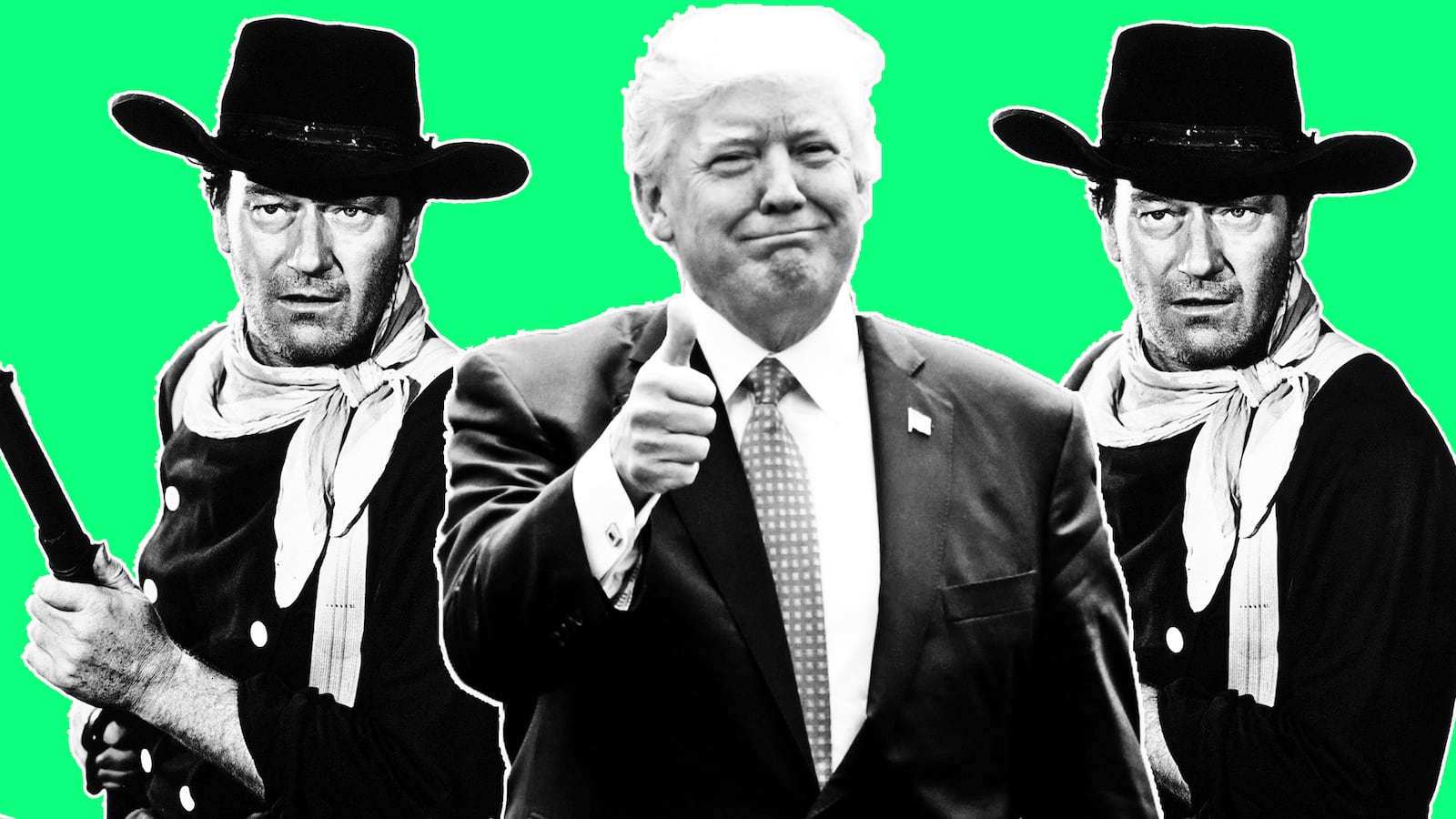American masculinity is having a rough year, and, if right-of-center opinion columnists are to be believed, it’s all thanks one man: President Donald Trump.
Conservative thought leaders agree that Trump has taken the sacred American institution of manhood—the stern, uncrying, horse-riding kind that John Wayne used to pretend to exhibit for a living—and made a mockery of it. They want us to go back to how it used to be, when men were tough and in control and always made good decisions.
The most recent entry in the mini-boom of masculinity nostalgia porn comes by way of David Brooks in The New York Times. In today’s column, Brooks waxes sentimental about two bygone eras of men, both of which the current Trump White House is currently insulting. Given the historical examples of positive manhood—the Greeks and the Founding Fathers—why couldn’t Trump and company have chosen one of them instead of the goofy gangster-from-the-movies model on which they’ve settled?
Brooks writes that this ideal “magnanimous man,” conceived thanks to the lessons of Greek tragedies, “is a bit aloof, marked more by gravitas than familiarity. He shows perfect self-control because he has mastered his passions. He does not show his vulnerability.”
Similarly, Peggy Noonan’s most recent column dove in on Trump. “He’s not strong and self-controlled, not cool and tough, not low-key and determined,” she wrote. She then compared him to a woman, and called him weak in the Wall Street Journal’s best approximation of Jeff Ross.
“The way American men used to like seeing themselves, the template they most admired, was the strong silent type celebrated in classic mid-20th century films—Gary Cooper, John Wayne, Henry Fonda,” Noonan points out.
Both Brooks and Noonan would like to return to an era that once existed, an era of sanity and control. But both Brooks and Noonan cite fictional depictions of manhood as things to which we should return.
The Greek Myths? The Founding Fathers? People Gary Cooper used to play in movies?
None of these things are real, and the ones that were have been so mythologized that it’s difficult to separate fact from legend.
At no point in American history, and, for that matter, human history have men behaved en masse in the way Brooks and Noonan imagine that they once did. The Founding Fathers created a nation, but they also owned slaves, relegated women to sub-citizens, and routinely dueled each other, which is completely insane.
The Greeks advanced human thought and civilization, but they were also a warlike collection of city-states fighting each other with regularity.
And lamenting the current dearth of men in the mold of characters that Gary Cooper, John Wayne, and Henry Fonda once played in movies makes about as much sense as lamenting that there are no more Marty McFlys. These things aren’t real.
Brooks and Noonan miss the golden age of men? What golden age? Where and when was this golden age? Because most people who are not men or are not white would likely argue that this age never happened, that it’s a work of fiction.
Was it during the Vietnam War? Not a lot of cool and in-control people involved in that. How about when men were blocking the doors of schools that were about to be integrated? How about during World War II, when the very best of men came up against an equal and opposite evil manifestation of manhood? Or maybe the Roaring 20’s, not exactly the picture of control and restraint. Looking back and back and back will lead a person to increasingly fictionalized ideals of manhood that have no basis in reality, and few positive outcomes for people who weren’t wealthy, white, and male.
Hidden between the lines in both pieces was a nostalgia for Ronald Reagan. Both columnists allude to the popular conservative fairytale of what Reagan was, but the reality of the Reagan era doesn’t match with the soft-focus of their Morning In America memories. Iran-Contra, the disastrous war on drugs, and Reagan’s zealotry around abortion betray that narrative’s fiction. Reagan wasn’t wholly evil, nor was he wholly good. But, like the actors Noonan admires, he definitely played the role of President like a champ.
Historical masculinity fanfiction isn’t confined to the pages of The New York Times and the Wall Street Journal. Last week, Congressman Blake Farenthold expressed a desire to return to this time when he gallantly offered to duel female senators. With pistols. Trump’s 43 days on the golf course since his swearing in express a desire to return to a time when men golfed every weekend to get away from their wives, and it wasn’t weird. And Texas’s pro-life legislators are legislating themselves back to an era of pre-1970’s maternal mortality.
Manhood has never been wholly good; if it was, human history would not be so continually bloody and cruel. Nor have “control” and “strength” been exclusively male traits; if they were, women would be incapable of being mothers, holding jobs, existing without men.
There’s something bitterly ironic about chastising Trump’s fondness for acting out fake masculinity he’s seen in movies by suggesting he act out fake masculinity from a movie. But Noonan and Brooks’ argument is insidious as well, because it suggests that stability will come from regression, regression to a time when the perceived infallibility of manhood led to injustice and pain for those unwilling or unwelcome to play along.
Both pining for the imaginary past that Brooks and Noonan imagine for the American man, and the opiatic #MAGA balm Trump peddled to his campaign crowds, are fiction. The only difference is that one looks better on a red hat.






